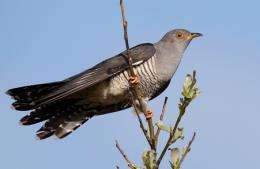July 9, 2015 report
Study offers hints on why some bird hosts reject parasitic eggs while others do not

(Phys.org)—A pair of researchers with Australia National University has conducted a study of parasitic egg laying with birds and as a result has found some hints on why it is that some hosts reject parasitic eggs while others do not. In their paper published in The Royal Society - Biology Letters, Iliana Medina and Naomi Langmore describe the study they conducted and what they learned as a result.
Some birds lay eggs in the nests of other birds so that they will not have to raise them, this practice is known as parasitic egg laying, and works well enough for parasitic species to survive. But not all hosts welcome the parasitic eggs, some ignore them, or push them out of the nest. Also, some of the hatchlings are better guests than others, cuckoos for example, are known to push the other hatchlings out of the nest. In this new effort, the researchers sought to learn why it is some hosts are more tolerant than others.
To find out, they looked at prior studies of parasitic bird practices—in all they found data on 198 different species, and took note of factors such as the environment in which the birds lived, the location, etc. and then drew up a phylogenetic tree. In studying their tree they were able to spot commonalities, such as that birds in northern latitudes were more likely to reject parasitic eggs. They also found that hosts tended to tolerate chicks that required a different diet than their own—such chicks would likely die anyway. Also, they found that eggs of parasitic chicks, such as cuckoos, that would hatch into birds larger than their own were often rejected—they same fate often befell eggs from birds that were a close relative. The researchers also noted that when some species such as cuckoos experienced high rejection rates from one species, they tended to move to another.
In answer to the original question of why some birds tolerate parasitic eggs, the researchers suggest it is because sometimes it is almost impossible for host birds to tell the difference between eggs, and sometimes it is because the danger of harming their own young accidently is too great. They note that many species have constantly evolving egg coloring or design patterns to help prevent deception.
More information: The costs of avian brood parasitism explain variation in egg rejection behaviour in hosts , Biology Letters, DOI: 10.1098/rsbl.2015.0296
Abstract
Many bird species can reject foreign eggs from their nests. This behaviour is thought to have evolved in response to brood parasites, birds that lay their eggs in the nest of other species. However, not all hosts of brood parasites evict parasitic eggs. In this study, we collate data from egg rejection experiments on 198 species, and perform comparative analyses to understand the conditions under which egg rejection evolves. We found evidence, we believe for the first time in a large-scale comparative analysis, that (i) non-current host species have rejection rates as high as current hosts, (ii) egg rejection is more likely to evolve when the parasite is relatively large compared with its host and (iii) egg rejection is more likely to evolve when the parasite chick evicts all the host eggs from the nest, such as in cuckoos. Our results suggest that the interactions between brood parasites and their hosts have driven the evolution of egg rejection and that variation in the costs inflicted by parasites is fundamental to explaining why only some host species evolve egg rejection.
Journal information: Biology Letters
© 2015 Phys.org



















